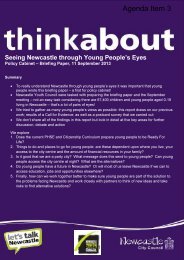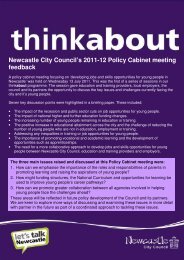NEWCASTLE'S MUSICAL HERITAGE AN INTRODUCTION By ...
NEWCASTLE'S MUSICAL HERITAGE AN INTRODUCTION By ...
NEWCASTLE'S MUSICAL HERITAGE AN INTRODUCTION By ...
Create successful ePaper yourself
Turn your PDF publications into a flip-book with our unique Google optimized e-Paper software.
especially for these bands and they did not rely wholly on arrangements. The aim<br />
of these concerts was relaxed informality. A series of concerts by Amers’ Band in<br />
May and June 1901 was advertised as,’Will fill the listening air with lovely<br />
melodies and in the words of the bard of Avon “discourse most eloquent music”.<br />
In 1903 a Fete Champetre at the Riding School Grounds in Northumberland<br />
Road was being advertised, to take place for one month, commencing on 5 th<br />
September. Promenade Concerts by the Northumberland Hussars Band under<br />
the direction of Lieut. H.G. Amers. Amers and his band appears again in 1907<br />
and in the printed programme there is a picture of the handsome bandleader<br />
resplendent in full uniform. Another programme from the same period shows him<br />
in a different uniform with the combined bands of the Northumberland Hussars,<br />
featuring songs sung by Madame Norman Snowball.<br />
In 1901 John Philip Sousa, himself, came to Newcastle with his famous band<br />
and raised the roof of the Town Hall. Comments written on the programme in<br />
pencil against each item played (presumably by the original owner on the night)<br />
read, perfect, lovely, charming, grand and grandioso. The Black Dike<br />
(programme spelling) played in 1902 and in 1911 the Ellery Band performed for<br />
one week. The blurb on the billing for this band of fifty Italian Americans stated<br />
that they refused to bow to the popular clamour for inferior music and had done<br />
wonders in the way of uplifting the taste for really good music. Their programmes<br />
were made up of music by Beethoven, Handel, Wagner, Gounod, Verdi,<br />
Waldteufel, Mascagni, Leoncavallo, Nicolai, Boito and Flotow. In 1918 more<br />
Italian musicians turned up in Newcastle in the form of the Band of the Royal<br />
Italian Carabiniere. They gave an impromptu performance in front of the Joseph<br />
Cowan monument on Westgate Road, another in front of St Nicholas’ and a third<br />
down on Sandhill in front of the Commercial Exchange. This must have been a<br />
sight to behold - seventy-five musicians in Napoleonic costumes. Mr Sutherland<br />
of the Exchange extended a welcome and told them that in 1854 Garabaldi was<br />
on board a vessel in the Tyne and as soon as this was known there was a<br />
spontaneous collection around Tyneside, limited to one penny a head, in order<br />
that the people could present him with a sword and telescope. This must have<br />
gone down well with the Italians as the Band of the Rome Promenade Concerts<br />
followed hot on the heels of the Carabinieri that same year.<br />
At one of the meetings of the People’s Concerts Committee in the Town Hall a<br />
committee member remarked that the Police Concerts were the best concerts<br />
being given in Newcastle at the time. I would not entirely agree with that<br />
statement but it has to be said that the Annual Police Concert, in aid of various<br />
charities including the Newcastle Constabulary Benevolent Fund and War Relief<br />
Funds was always, at least vocally, of a high standard. In 1890 and 1892 Adelina<br />
Patti (1843-1919) known as the Queen of Song, idolised in Paris, Milan,<br />
Brussels, Monte Carlo, St. Petersburg, Moscow, Berlin, Vienna, Madrid and<br />
Lisbon, obliged the Law by appearing at their annual concert and sang a number<br />
of operatic arias as well as the song ‘Il Bacio’ and the beautiful ‘Banks of Allen<br />
Water’. Other singers making an appearance at these concerts over the period<br />
69

















